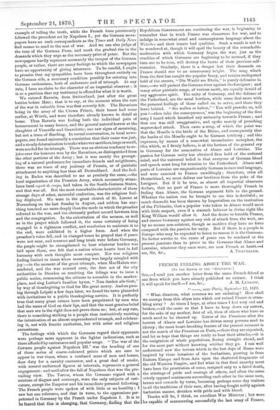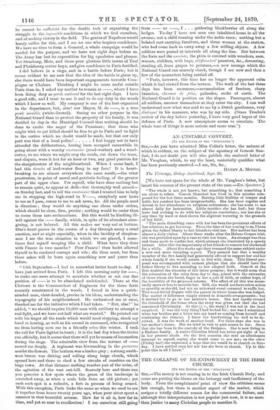FRENCH FEELING ABOUT THE WAR.
[To TRH EDITOR OF TOR "SPECTATOR."] SIR,—/ send you another letter from the same French friend as one from which you have already published an extract. I think
it will speak for itself.—.I am, &c., J. M. LUDLOW.
"-, near Paris, September 12, 1870.
"What disasters, what reverses we are enduring ! How shall we emerge from this abyss into which our ruined France is crum- bling away ? At times I hope, at other times I feel very sad and broken,—all the more so that I have to keep down my sorrow, for the sake of my mother, first of all, then of others who have so much need to be cheered up. Terror of the Prussians after the horrors of Alsace and Lorraine has driven many persons mad to idiotcy ; the most heart-breaking feature of the present moment is not the march of the Prussians on Paris,—there they are expected, and let us hope that things are ready to bear their attacks,—it is the emigration of whole populations, fleeing straight ahead, and for the most part without knowing whither they go. I can well understand now the terrors which in the last days of Rome were inspired by those invasions of the barbarians, pouring in from Eastern Europe and from Asia upon the shattered fragments of the old Western Empire, and feel what in that final anarchy must have been the prostration of some, resigned only to a fated death, the stirrings of pride and courage of others, and often the same utterly opposed sentiments succeeding each other in the same men, heroes and cowards by turns, becoming perhaps some day traitors to all the traditions of their race, after having fought nobly against barbarian masses, drunken with pride and with blood.
Troehu will be, I think, an excellent War Minister ; but were he capable of mano3uvring successfully the last army of France, he cannot be sufficient for the double task of organizing the struggle in the impossible conditions in which we find ourselves, and of seeking victory in the field. The genius of Napoleon would barely suffice for this, and I see no one who inspires confidence. We have no time to form a General, a whole campaign would be needed for the purpose, and we have not eight days before us. The Army has lost its superstition for big epaulettes and plumes. Yet Strasburg, Metz, and those poor glorious little towns of Toul and Phalsbourg revive hope, and give confidence in Paris fortified.
I did believe in a siege, and in a battle before Paris; but it seems evident to me now that the idea of the battle is given up, else there would have been important engagements towards Com- piegne or Chalons. Thinking I might be more useful outside Paris than in, I asked my mother to remain at —, where I have been doing duty as garde national for the last eight days. I have a good rifle, and I trust to use it and to do my duty in the woods which I know so well. My company is one of the best organized in the department, but, alas ! our Mayor, M. de —, is a true poule mouillde (white-livered). Seeing no other purpose in the National Guard than to protect the property of his family, it was decided to day in the Municipal Council that nothing should be done to excite the anger of the Prussians ; that those who might wish to get killed should be free to go to Paris and to fight in the sorties which no doubt would be made, but that our only part was that of a local police I feel happy not to have attended the deliberations, having been occupied meanwhile in going about with a worthy cantonnier (road-worker) and a wood- cutter, to see where we might stop the roads, cut down the trees, and dispute, were it but for an hour or two, any good position for the sharpshooters of the neighbourhood. When I came back, I had this douche of iced-water flung in my face ! It is heart- breaking to see almost everywhere the same result,—the utter prostration, in point of moral and patriotic feeling, of the greater part of the upper class. For myself, who have done nothing but to remain quiet, to appear at drill—but thoroughly well armed— on Sunday last, and to tell the cantonnier that I wanted him to help me in stopping the high-road to V—, everybody now bows to me as I pass, comes to me to ask news, &c. All the people need is direction ; they would do anything one chose under orders, which should be clear, firm, precise ; nothing would be easier than to rouse them into acclamations. But this would be kindling ill- will against the — family, which, in spite of its abundant alms- giving, is not beloved. All this makes me very sad at bottom. One's heart passes in the course of a day through many a cruel emotion, and at night especially, when in the lucidity of sleepless- ness I see the true situation in which we are placed, I some- times find myself weeping like a child. What have they done with France in two months ? Poor France ! thou hadst allowed thyself to be rendered corrupt and vile ; die thou must, but from those ashes will be born again something new and purer than before.
"14th September.—I feel in somewhat better heart to-day. I have just arrived from Paris. I left this morning early for —, to make one more attempt to ascertain whether or not our fine position of — is to be abandoned undefended. There at the Chateau is the Commandant of Engineers for the three forts recently constructed in the woods. I found in him a quick- minded man, clear-headed, precise in his ideas, understanding the topography of his neighbourhood. He understood me at once, thanked me for the initiative which I had taken. "But, alas !" he added, "we should require 10,000 men with artillery to attempt a real fight, and we have not half what are wanted." He pointed out with his finger all the roads which would need stopping, shook my hand at leaving, as well as his second in command, who recognized me from having seen me in a friendly salon this winter. I took the rail for Paris lighter in heart ; it is the last day when the trains run officially, but it seems that there will yet be means of locomotion during the siege. The admirable view from the terrace of moved me deeply. A regiment was bivouacking in the parterres amidst the flowers. The horizon was a leaden grey ; a strong south- west breeze was driving and rolling along large clouds, which opened here and there to shed a few streaks of sunshine on the huge town. At that distance nothing reaches you of the noise, of the agitation of the vast ant-hill. Scarcely here and there can you perceive a few spots where the green of the landscape is scratched away, as when a scale falls from an old picture ; yet each such spot is a redoubt, a fort in process of being armed. With this exception, Paris looks the same as when we used to see it together from hence twenty years ago, when your sister spent a summer in that beautiful avenue. How far it all is, how far in time, and yet so near in recollection ! I see ourselves still going from — to —, I . . . gathering blackberries all along the hedges. To-day I have not seen one inhabited house in all the avenue, not a child running under the noble trees ; nothing but a belated cart carrying furniture, and three women at the station, who had come back to carry away a few trifling objects. A few soldiers were posted at intervals all along the line. But between the forts and the enceinte, the plain is covered with wreckers, men, women, children, with bags, chiffonniers' panniers, &c., devouring, stealing all, from grapes to potatoes,—a new scourge which the National Guard can scarcely check, though I see now and then a few of the marauders being carried off.
"Paris, however, this time has no longer the apparent calm which it had viewed from the terrace. The work of the last three days has been enormous,—accumulation of fascines, sharp branches, chevaux de frise, palisades, sacks of earth. The National Guard is in position on the slopes. Passengers, almost all soldiers, uncover themselves as they enter the city. I can well understand now what was said to me by a Dutch gentleman, very distingue in his manners, who was by my side. (Since Trochu's review of the day before yesterday, I have very good hopes of the defence of Paris. A new atmosphere seems to circulate. The whole tone of things is more serious and more true.")































 Previous page
Previous page